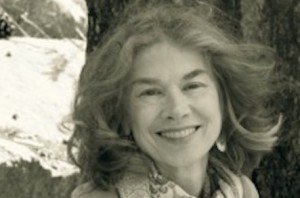 Brenda Hillman, who so generously allowed me to audit her class last fall, has just won the Griffin Poetry Prize, a very big deal in the poetry world, for her most recent book, Seasonal Works with Letters on Fire. (Her photo here was taken by Brett Hall Jones, who manages the Squaw Valley Community of Writers, a poetic feat in it’s own right.)
Brenda Hillman, who so generously allowed me to audit her class last fall, has just won the Griffin Poetry Prize, a very big deal in the poetry world, for her most recent book, Seasonal Works with Letters on Fire. (Her photo here was taken by Brett Hall Jones, who manages the Squaw Valley Community of Writers, a poetic feat in it’s own right.)
The judges’ citation starts: “Seasonal Works with Letters on Fire concludes Brenda Hillman’s tetralogy on the four elements of classical thought. She steers wildly but ably through another day of teaching, a ceremonial equinox, the distress of bee colony collapse; space junk, political obstruction, military drones, administrative headaches, and everything in between. The ‘newt under the laurel’ and ‘the herring purring through the eelgrass’ don’t escape her arc of acuity.”
This poem is from one of her early books, Bright Existence, and it remains one of my favorites, the way it mixes the daily with the darker, ongoing undercurrent of reflection (what they call “steering wildly but ably”) and probably also because the terrain is so familiar to me:
Several Errands
The shoe repairman works behind the married shoes,
his whole hand inside the boot he’s shining,
everything cozy in the glass displays, laces paired
on gravel he’s spread out in the window, shoes
placed as though they’re walking, and beside them
propped up, the wooden tongues of shoe horns, poised
to serve the inanimate world … He comes out mildly
attentive, soft accent, possibly a Scottish
childhood, possibly sheep to tend … Clear day,
first summer divorced in Berkeley, a time of seamless, indescribable grief; he waits kindly in his blue apron,
fingering the well-worn inner sole, and I am grateful
for those who serve us knowing nothing of our lives …
*
The cleaner waits behind the silver bell;
he’s from Cambodia and has free Christian literature
on the counter. He greets me with pleasant chatter,
searches through the coats, some left for years,
he says; they make a soft blue whistle as they circulate
on the ovals like the ones under those automatic boats.
As the clothes pass, little checks and prints under
the whooshing of motion, I see my husband’s coat—
how long will I call him my husband—like an old friend
passing by quickly not bothering to greet me. Odd now,
I don’t have to pick it up, the serious plaid will go
around between the women’s suits and stay all night. . .
*
I watch the young butcher flipping over the young
chicken: he takes one wing and sort of spins it,
first on its back, flinging the trimmed, watery
lemon-colored fat into the trash, then before
he starts on the legs he puts his hand so deeply in
that the finger comes out the neck … The other butcher
sets the slab of beef under the saw: the riveting
intricate swirl as the dead flesh pulls away;
he goes off, shouts short words from the deep freeze—
to me or to the carcass hanging by the shank?—
I can wait, but the spaces can’t, there’s a slight
ticking, then the carcass swings and swings …
Somehow I thought we would know everything
through the flesh. Perhaps. But my days have become
spirit. The young butcher splits the chicken
down the back, seems to enjoy the crack of the knife
as it enters the bone, so I try to. Housewives lean
against the cool glass to convey holiday news and he
responds without really looking up; I love that.
*
oh Berkeley summer mornings, aren’t they—
what? past the French Hotel, the glint of tiny spoons
so briefly and soberly allowed to rest on white saucers,
the plums just about over, the agapanthus—“lilies of denial”—
in the center dividers, blooming, or just about to—
like me, hearty and hesitant, not wanting to write it,
not wanting to ruin the perfection of the poem
by writing it . . . At the dentist, the little mirror,
the dinosaur prong is put into the mouth. Mouth:
the first darkness. Nearby: the mobile with straw
eyeless fishes. The dentist will go home to her family,
having briefly reached inside the visible mystery
and found nothing … I imagine Wisdom in the text
is like this, creating the cosmos from the mind of God,
looking interested and competent; she touches
the physical place with her prong, and the pain shines …
(—a man told me I better think
about my ‘system.’
Oh dear! I better
think about my ‘system’—!)
Brenda Hillman
So several cheers for Brenda, who manages to be both an exemplary human being and a terrific poet.